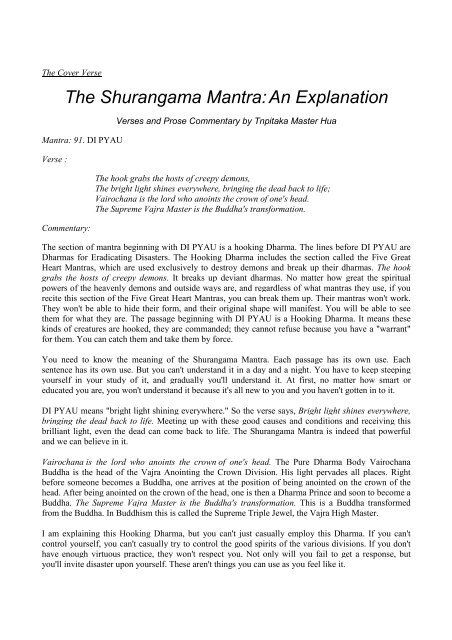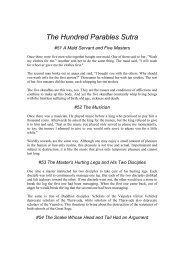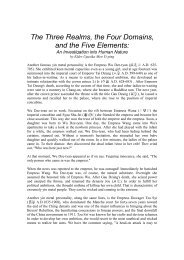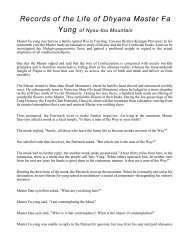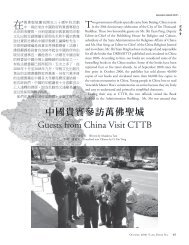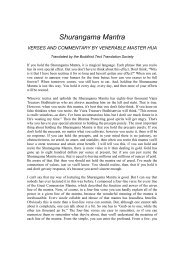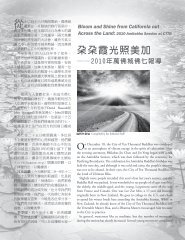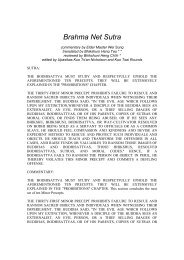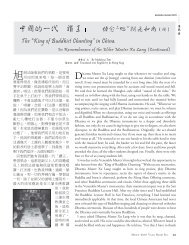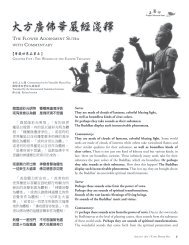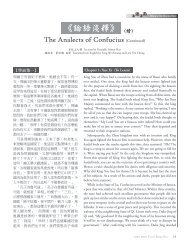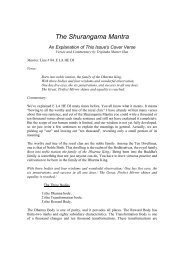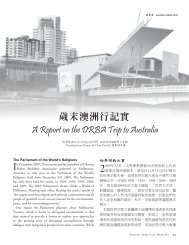The Shurangama Mantra:An Explanation
The Shurangama Mantra:An Explanation
The Shurangama Mantra:An Explanation
You also want an ePaper? Increase the reach of your titles
YUMPU automatically turns print PDFs into web optimized ePapers that Google loves.
<strong>The</strong> Cover Verse<br />
<strong>The</strong> <strong>Shurangama</strong> <strong>Mantra</strong>: <strong>An</strong> <strong>Explanation</strong><br />
<strong>Mantra</strong>: 91. DI PYAU<br />
Verse :<br />
Commentary:<br />
Verses and Prose Commentary by Tnpitaka Master Hua<br />
<strong>The</strong> hook grabs the hosts of creepy demons,<br />
<strong>The</strong> bright light shines everywhere, bringing the dead back to life;<br />
Vairochana is the lord who anoints the crown of one's head.<br />
<strong>The</strong> Supreme Vajra Master is the Buddha's transformation.<br />
<strong>The</strong> section of mantra beginning with DI PYAU is a hooking Dharma. <strong>The</strong> lines before DI PYAU are<br />
Dharmas for Eradicating Disasters. <strong>The</strong> Hooking Dharma includes the section called the Five Great<br />
Heart <strong>Mantra</strong>s, which are used exclusively to destroy demons and break up their dharmas. <strong>The</strong> hook<br />
grabs the hosts of creepy demons. It breaks up deviant dharmas. No matter how great the spiritual<br />
powers of the heavenly demons and outside ways are, and regardless of what mantras they use, if you<br />
recite this section of the Five Great Heart <strong>Mantra</strong>s, you can break them up. <strong>The</strong>ir mantras won't work.<br />
<strong>The</strong>y won't be able to hide their form, and their original shape will manifest. You will be able to see<br />
them for what they are. <strong>The</strong> passage beginning with DI PYAU is a Hooking Dharma. It means these<br />
kinds of creatures are hooked, they are commanded; they cannot refuse because you have a "warrant"<br />
for them. You can catch them and take them by force.<br />
You need to know the meaning of the <strong>Shurangama</strong> <strong>Mantra</strong>. Each passage has its own use. Each<br />
sentence has its own use. But you can't understand it in a day and a night. You have to keep steeping<br />
yourself in your study of it, and gradually you'll understand it. At first, no matter how smart or<br />
educated you are, you won't understand it because it's all new to you and you haven't gotten in to it.<br />
DI PYAU means "bright light shining everywhere." So the verse says, Bright light shines everywhere,<br />
bringing the dead back to life. Meeting up with these good causes and conditions and receiving this<br />
brilliant light, even the dead can come back to life. <strong>The</strong> <strong>Shurangama</strong> <strong>Mantra</strong> is indeed that powerful<br />
and we can believe in it.<br />
Vairochana is the lord who anoints the crown of one's head. <strong>The</strong> Pure Dharma Body Vairochana<br />
Buddha is the head of the Vajra <strong>An</strong>ointing the Crown Division. His light pervades all places. Right<br />
before someone becomes a Buddha, one arrives at the position of being anointed on the crown of the<br />
head. After being anointed on the crown of the head, one is then a Dharma Prince and soon to become a<br />
Buddha. <strong>The</strong> Supreme Vajra Master is the Buddha's transformation. This is a Buddha transformed<br />
from the Buddha. In Buddhism this is called the Supreme Triple Jewel, the Vajra High Master.<br />
I am explaining this Hooking Dharma, but you can't just casually employ this Dharma. If you can't<br />
control yourself, you can't casually try to control the good spirits of the various divisions. If you don't<br />
have enough virtuous practice, they won't respect you. Not only will you fail to get a response, but<br />
you'll invite disaster upon yourself. <strong>The</strong>se aren't things you can use as you feel like it.
Not every person at the City of Ten Thousand Buddhas is necessarily here to cultivate the Way. Some<br />
are here just to visit, and some are here to investigate. Not everyone is a cultivator of the Way. But<br />
whether you cultivate or not, at the City of Ten Thousand Buddhas the most important thing is that you<br />
are not allowed to make trouble for other people. You can't give other people afflictions. No one is<br />
allowed to get angry at anyone else. I have said this before, but I repeat: whoever gets angry has to<br />
walk behind the person now behind him in line. That's not just for one time, but for every time you get<br />
angry you have to move back one place in line. You can't think that because you moved back one place<br />
you can get mad all you want. If you keep getting angry, giving other people trouble, breaking other<br />
people apart, and making up gossip, you should be ashamed and go back a place in line. If you get<br />
angry again, then move back another step. Otherwise you'll just keep giving people trouble.<br />
<strong>An</strong>d you can't be shameless and refuse to move back in line even though you got angry, pretending you<br />
didn't hear it. That's just being shameless and having skin on your face as thick as a tire. In that case<br />
you should go be a tire. Don't be a person. Tires are good for cars, but they aren't all that attractive as<br />
faces. Regardless of who you are, you have to move back a place in line every time you get angry. If<br />
you think, "I want to be at the very end of the line," fine, then keep getting angry and moving back.<br />
You'll look really humble, but as far as cause and effect goes, it's very bad. You should not let your<br />
anger get away from you and casually get angry and give people trouble. Whoever has this fault, you<br />
should examine yourself. I am saying it. Listening is up to you. If you want to gain an unretreating<br />
Bodhi heart, then don't make mistakes in cause and effect. If you make mistakes in cause and effect, it's<br />
not known when you will be able to attain enlightenment. I am saying these things for the good of<br />
Buddhism. I am not taking sides with anyone. If you think it's wrong, bring it up and we'll investigate it.<br />
I would never insist that things be my way. If you feel it's inconvenient for you, you can change it. If<br />
you want to listen to it, then listen. If not, pretend it's the wind blowing in one ear and out the other—<br />
forget it.


